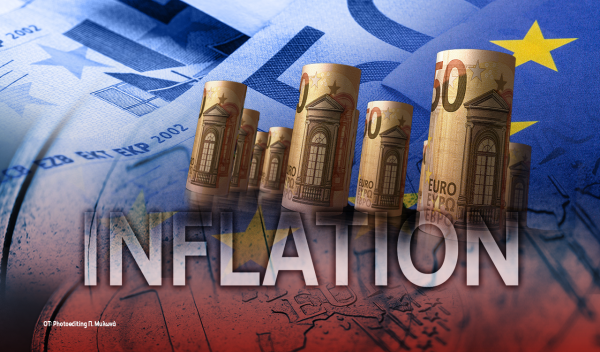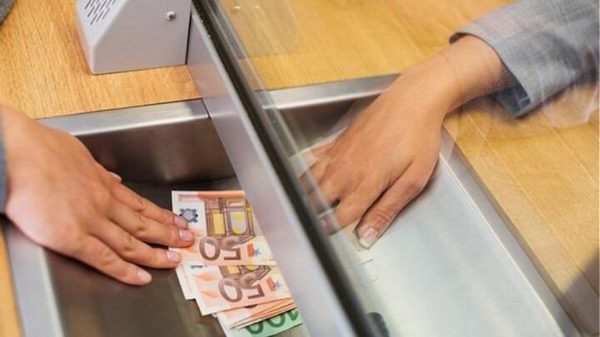
The Bank of Greece data on the course of deposits in February signaled a decrease in household incomes and business turnover.
According to the Bank, the balances of the private sector in the banks fell on a monthly basis by 260 million euros, an amount that is to be added to the outflows of more than 2.2 billion euros in January.
This decrease was mainly due to the companies, which were forced to use their savings to cover the obligations of the period, given that the market movement was sluggish for the second consecutive month.
In particular, their deposits in the banking sector fell by 215 million euros, increasing the losses of 2022 to about 2 billion euros.
The decline was even greater for non-financial corporations, whose deposit balances fell by 333 million euros in February after falling by 2.39 billion euros in the first month of 2022.
Net outflows for households were lower, reaching € 45 million in February, following a decline of € 457 million in January.
The market froze
Banking sources note that the decline in size reflects the disruption caused by the energy crisis in the real economy. It is characteristic that it is the first negative February for individuals, recorded since 2017.
Rising inflation, which has made more expensive commodities more expensive, has resulted in lower consumption of elastic demand products.
Thus, households were forced to meet the needs of the period from the ready, reducing their unnecessary expenses, while the freezing of the market led thousands of businesses to use their deposits to pay the obligations of the period.
The same circles note that similar trends are recorded in March, as reflected in payments via POS to their companies – customers.
Market financing
In fact, the above performance occurred in a period of positive flow from funding to the private sector, which shows the serious problem that currently exists in the real economy.
Without corporate loan credits, the decline in deposits would have been even greater.
According to the Bank of Greece, the annual rate of change in total private sector financing increased to 1.4% from 0.9% last month.
The monthly net flow of total financing to the private sector was positive by 969 million euros, compared to a negative net flow of 1,303 million euros last month.
In more detail:
– Business financing
The monthly net flow of financing to businesses in February 2022 was positive by € 1,030 million, compared to a negative net flow of € 994 million last month, while the annual rate of change increased to 4.4% from 3.5% in last month.
The annual rate of change in the financing of non-financial corporations (NFIs) stood at 2.9% from 2.8% in the previous month. The monthly net flow of their funding was positive by 363 million euros, compared to a negative net flow of 637 million euros last month.
– Financing of freelancers, farmers and sole proprietors
In February 2022, the monthly net flow of funding to the self-employed, farmers and sole proprietors was positive by € 8 million, compared to a negative net flow of € 66 million the previous month. The annual rate of change of their financing decreased to 0.9% from 1.1% in the previous month.
– Financing of individuals
The negative net flow of funding to individuals and private non-profit institutions in February 2022 was negative by 69 million euros, compared to a negative net flow of 244 million euros in the previous month.
The annual rate of change of their financing remained almost unchanged at -2.3%.
Latest News

Current Account Deficit Fell by €573.2ml Feb. 2025: BoG
The improvement of Greece’s current account was mainly attributed to a more robust balance of goods and, to a lesser extent, an improved primary income account

Hellenic Food Authority Issues Food Safety Tips for Easter
Food safety tips on how to make sure your lamb has been properly inspected and your eggs stay fresh.

Greek Kiwifruit Exports Smash 200,000-Ton Mark, Setting New Record
According to data by the Association of Greek Fruit, Vegetable and Juice Exporters, Incofruit Hellas, between September 1, 2024, and April 17, 2025, kiwifruit exports increased by 14.2%.

Easter Tourism Boom: Greece Sees 18.3% Surge in Hotel Bookings
Among foreign markets, Israel has emerged as the biggest growth driver, with hotel bookings more than doubling—up 178.5% year-on-year.

Greece to Launch Fast-Track Tender for Offshore Hydrocarbon Exploration
Last week, Papastavrou signed the acceptance of interest for the two Cretan blocks, while similar decisions regarding the two Ionian Sea blocks were signed by his predecessor

American-Hellenic Chamber of Commerce to Open Washington D.C. Branch
AmCham's new office aims aims to deepen U.S.-Greece economic ties and promote investment and innovation between the two countries

Why Greece’s New Maritime Spatial Plan Is a Geopolitical Game-Changer
This landmark development is more than just a bureaucratic step — it's a strategic declaration about how Greece intends to use, protect, and assert control over its seas

Eurozone Inflation Eases to 2.2% in March
Compared to February, inflation decreased in 16 member states, remained unchanged in one, and rose in ten.

Bank of Greece: Primary Gov. Surplus €4.1b Jan.-March 2025
The data released today by the Bank of Greece revealed that the central government’s overall cash balance recorded a surplus of €1.465 billion in the first quarter of 2025, compared to a deficit of €359 million in the corresponding period of 2024.

Greek Government Reissues 10-Year Bond Auction for €200 Million
The amount to be auctioned will be up to 200 million euros, and the settlement date is set for Friday, April 25, 2025 (T+5)








![Πλημμύρες: Σημειώθηκαν σε επίπεδα ρεκόρ στην Ευρώπη το 2024 [γράφημα]](https://www.ot.gr/wp-content/uploads/2025/04/FLOOD_HUNGRY-90x90.jpg)

































 Αριθμός Πιστοποίησης
Αριθμός Πιστοποίησης